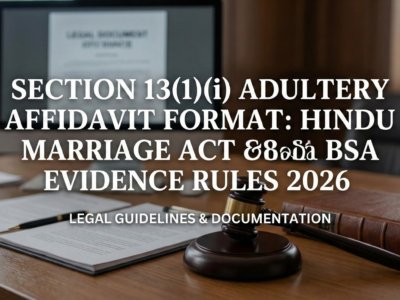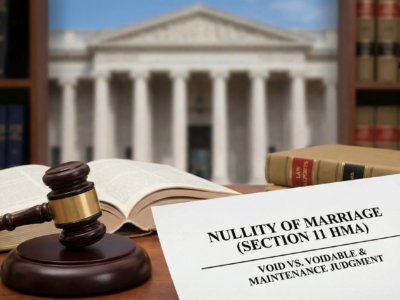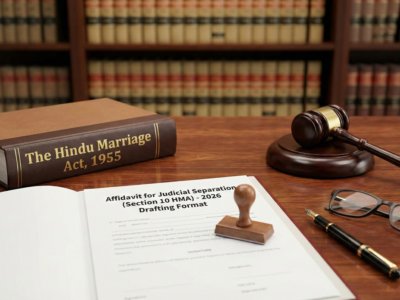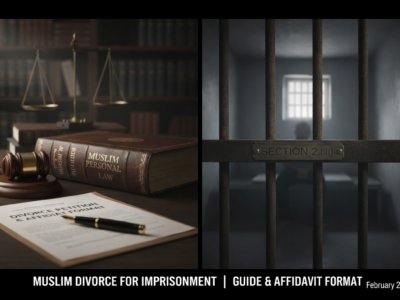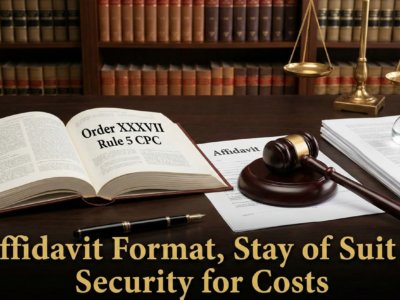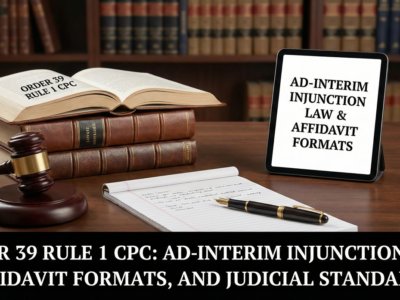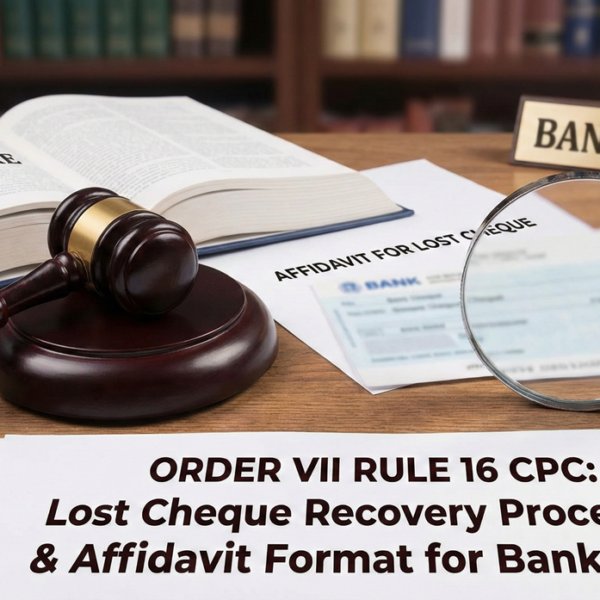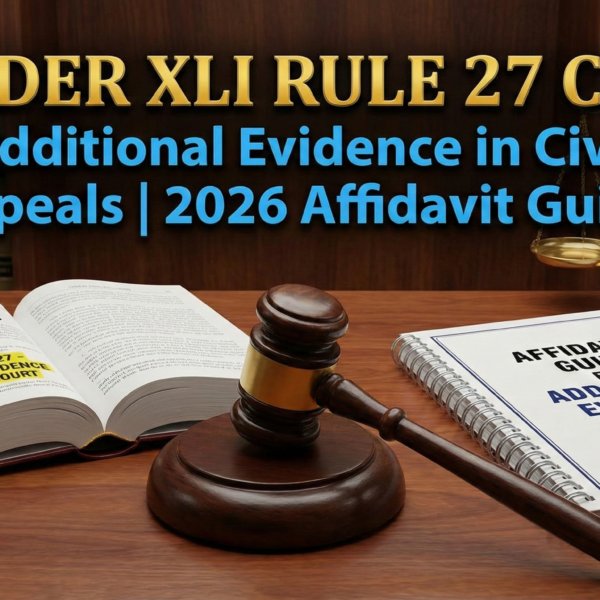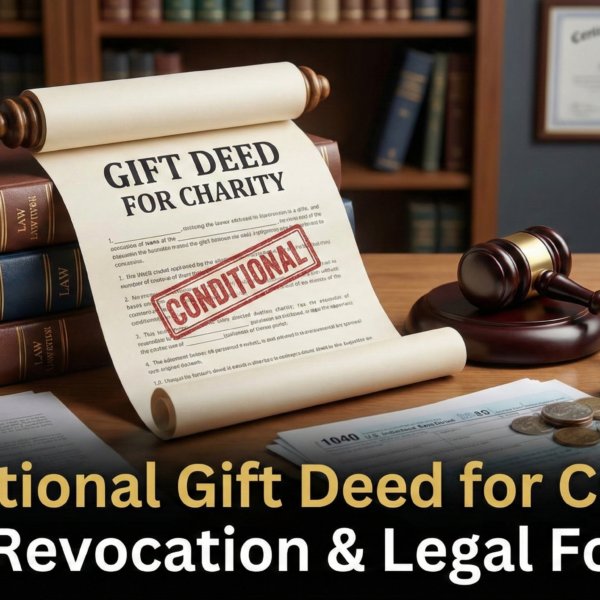After a testator’s death, the executor or beneficiary is faced with the critical task of validating the Will. In India, this involves two distinct legal paths: judicial probate under the Indian Succession Act, 1925, and administrative post-death registration under the Registration Act, 1908. A common and costly mistake is confusing the two. This comprehensive guide clarifies the difference, explains when probate is mandatory (especially in Mumbai, Kolkata, and Chennai), and provides a complete set of affidavit templates to help executors and legal heirs navigate this complex process.
Post-Death Will Validation in India: Procedures, Affidavits, and Template Formats
When a testator passes away, their Will begins its legal journey. In India, validating that Will involves two distinct procedures: administrative "Registration" and judicial "Probate." Understanding the difference is essential for any executor or beneficiary to correctly, and legally, administer an estate.
The Foundational Distinction: Registration vs. Probate
A widespread misconception is that "registration" at the Sub-Registrar's office is a legal substitute for "probate" from a court. This is incorrect. The two serve entirely different purposes.
Path 1: Registration (The Shield)
This is an optional, administrative process at the Sub-Registrar's office under the Registration Act, 1908.
- Purpose: Record-keeping. It creates a government-held record, safeguarding the Will against loss or tampering.
- Legal Effect: Provides evidentiary value. It acts as a strong shield against future claims of forgery.
Path 2: Probate (The Sword)
This is a judicial certification from a court of law under the Indian Succession Act, 1925.
- Purpose: To have a court judicially determine and certify the Will's authenticity as the testator's final, valid testament.
- Legal Effect: Grants legal authority. It is the sword required to establish rights, manage assets, and enforce the Will in court.
Do I Need Probate? A Quick Check
The requirement for probate is not uniform across India. It depends on the testator's religion and the geography of the Will's execution and property. Use this tool to get a preliminary idea.
A Deeper Look: The Two Legal Paths
This is the optional process of filing the Will at the Sub-Registrar's office under the Indian Registration Act, 1908. There is no time limit for this; Section 27 of the Act states a Will may be presented "at any time."
Registration Process Flowchart
Document Checklist (Registration)
| Document | Purpose & Source |
|---|---|
| Original Will | The primary document to be registered. |
| Testator's Death Certificate (Original) | To prove the testator is deceased (Sec 41). |
| Application for Registration | Formal request by the executor/beneficiary. |
| Affidavit of Attesting Witness(es) | Core evidence to prove the Will's execution. |
| Identity & Address Proofs | For the presenter, the attesting witnesses, and the testator. |
Key Affidavit Template
Template: Affidavit of Attesting Witness (for Sub-Registrar)
BEFORE THE SUB-REGISTRAR, [CITY/DISTRICT]
In the matter of Registration of the Last Will and Testament of:
Shri/Smt. [Testator's Full Name]
... DECEASED
AND
In the matter of Application for Registration by:
Shri/Smt. [Presenter's Full Name]
... APPLICANT / EXECUTOR
AFFIDAVIT
I, [Witness's Full Name], son/wife/daughter of [Witness's Father's/Husband's Name], aged about [Age] years, resident of [Witness's Address], do hereby solemnly affirm and state on oath as under:
1. That I, the deponent herein, am one of the attesting witnesses to the execution of the last Will and Testament dated [Date of Will] (hereinafter "the Will") executed by the late Shri/Smt. [Testator's Full Name] (hereinafter "the Testator").
2. That the aforesaid Testator executed the said Will on [Date of Will] at [Place of Execution] in my presence.
3. That at the time of the execution of the said Will, the Testator was in good health and possessed a sound and disposing mind, memory, and understanding.
4. That the Testator executed the said Will of his/her own free will and accord, without any force, coercion, or undue influence.
5. That the Testator signed the said Will in my presence, after understanding the contents. Thereafter, at the request of the Testator and in his/her presence, and in the presence of the other attesting witness (Shri/Smt. [Other Witness's Name]), I subscribed my signature to the said Will as an attesting witness.
DEPONENT
VERIFICATION
Verified at [Place] on this [Day] day of [Month], [Year], that the contents of the above affidavit, from paragraphs 1 to 5, are true and correct to the best of my personal knowledge. No part of it is false, and nothing material has been concealed therefrom.
DEPONENT
Note: This affidavit should be sworn before a Notary Public or an Oath Commissioner and printed on non-judicial stamp paper as per state rules.
This is the judicial process of certifying the Will in a competent court (District Court or High Court) under the Indian Succession Act, 1925. It is mandatory in certain key jurisdictions.
Probate Process Flowchart
The 3-Year Limitation Period: A Common Misunderstanding
The 3-year clock does *not* start from the date of death.
Document Checklist (Probate)
| Document | Purpose & Source |
|---|---|
| Probate Petition | The formal application to the court, drafted by an advocate. |
| Original Will & Codicils | The primary exhibit for the court to validate. |
| Testator's Death Certificate | Proof of death, invoking the court's jurisdiction. |
| Affidavit of Attesting Witness | Mandatory evidence to prove due execution (Sec 281). |
| Schedule of Assets & Liabilities | A full inventory of the estate, used for court fee calculation. |
| List of Legal Heirs | Names and addresses of all heirs who must be notified. |
| Consent Affidavits from Heirs | (Optional, but *highly* recommended) "No Objection" from heirs to speed up the process. |
Key Affidavit Templates
Template: Affidavit of Attesting Witness (for Court)
IN THE COURT OF THE DISTRICT JUDGE AT [CITY]
(Testamentary & Intestate Jurisdiction)
Petition No. ______ of 20__
In the Matter of the Estate of:
[Testator's Full Name]
... Deceased
AFFIDAVIT OF ATTESTING WITNESS
(Under Section 281, Indian Succession Act, 1925)
I, [Witness's Full Name], son/wife of [Witness's Father's/Husband's Name], aged about [Age] years, resident of [Witness's Address], do hereby solemnly affirm and state on oath as under:
1. That I knew the deceased Testator, Shri/Smt. [Testator's Full Name], and am one of the attesting witnesses to his/her last Will and Testament dated [Date of Will].
2. That on [Date of Will], I was present at [Place of Execution] along with Shri/Smt. [Other Witness's Name], the other attesting witness.
3. That on the said date, I saw the said deceased Testator sign and execute the said Will, which is attached to the main petition and marked as Annexure 'X'.
4. That the said Testator signed the said Will in my presence and in the presence of the other witness.
5. Thereupon, at the request of the said Testator, and in his/her presence, and in the presence of each other, I, the deponent, and the said [Other Witness's Name], did both subscribe our respective signatures to the said Will as attesting witnesses.
6. That at the relevant time when the Testator executed the said Will, he/she was of a sound and disposing mind, memory, and understanding, and made the said Will on his/her own free volition.
DEPONENT
VERIFICATION
(Standard verification clause)
Template: Consent Affidavit of Legal Heir (No Objection)
IN THE COURT OF THE DISTRICT JUDGE AT [CITY]
(Testamentary & Intestate Jurisdiction)
Petition No. ______ of 20__
In the Matter of the Estate of:
[Testator's Full Name]
... Deceased
CONSENT AFFIDAVIT / NO OBJECTION
I, [Legal Heir's Full Name], son/wife of [Heir's Father's/Husband's Name], aged about [Age] years, resident of [Heir's Address], do hereby solemnly affirm and state as under:
1. That the deceased, Shri/Smt. [Testator's Full Name], who died on [Date of Death], was my [Relationship, e.g., Father/Mother].
2. That I am one of the legal heirs of the said deceased as listed in the probate petition.
3. That I am aware that the deceased left behind his/her last Will and Testament dated [Date of Will].
4. That Shri/Smt. [Petitioner's Name] (the "Petitioner") has applied to this Hon'ble Court for the grant of Probate of the said Will.
5. That I have no objection to the grant of Probate of the said Will in favour of the Petitioner.
6. I hereby give my full and free consent for the Probate being granted, and I do hereby waive service of any and all notices or citations from this Hon'le Court in this matter.
DEPONENT
VERIFICATION
(Standard verification clause)
Registration vs. Probate: A Direct Comparison
| Feature | Registration (Sub-Registrar) | Probate (Court) |
|---|---|---|
| Governing Law | Indian Registration Act, 1908 | Indian Succession Act, 1925 |
| Governing Authority | Sub-Registrar | District or High Court |
| Core Purpose | Record-keeping; presumption of genuineness. | Judicial certification; grants legal authority. |
| Legal Effect | Evidentiary Value (The "Shield") | Legal Authority (The "Sword") |
| Is it Mandatory? | No. Always optional. | Yes, in cases linked to Kolkata, Mumbai, or Chennai. |
| Time Limit to Apply | None. Can be presented "at any time." | 3 years *from the date the right to apply accrues* (i.e., when a dispute arises). |
| Substitute for other? | No. A registered Will still needs probate if in a mandatory zone. | No. A probated Will is a final court order and does not need separate registration. |
An Executor's Strategic Roadmap
-
Step 1: Secure Original Documents
Immediately secure the Original Will and the Testator's Official Death Certificate. Both are non-negotiable for either process.
-
Step 2: Locate the Attesting Witnesses
This is the most important practical step. The affidavits from attesting witnesses are mandatory for *both* registration and probate. Without a living, cooperative witness, the process becomes far more complex.
-
Step 3: Perform the "Jurisdictional Triage"
Answer the two questions from our "Do I Need Probate?" tool: (A) Was the Will made by a Hindu/Sikh/Jain/Buddhist *inside* Kolkata, Mumbai, or Chennai? (B) Does the Will bequeath *immovable property* *inside* those three cities?
-
Step 4: Determine Your Legal Path
- If "YES" to either question in Step 3: Probate is mandatory. You must follow Path 2. Do not waste time on Sub-Registrar registration, as it is legally insufficient.
- If "NO" to both questions (e.g., a Will in Delhi for Delhi property): Probate is optional. You have a strategic choice:
- Gold Standard: File for probate anyway. This is recommended for complex estates or if family disputes are possible.
- Middle Ground: Proceed with post-death registration at the Sub-Registrar. This adds authenticity and may be sufficient for some administrative tasks.
Common Scenarios & Complications
The path to executing a Will is not always smooth. Here are some common legal hurdles and their potential remedies.
Scenario: What if an Attesting Witness is Not Available?
Proving a Will (for both registration and probate) depends on an affidavit from an attesting witness. If a witness is deceased, untraceable, or hostile, the law provides alternatives.
| Situation | Legal Remedy (under Indian Evidence Act, 1872) |
|---|---|
| One witness is deceased or cannot be found | The affidavit of the other available witness is sufficient. |
| Both witnesses are deceased or cannot be found | You must prove the signature of at least one witness AND the signature of the testator. This is done via an affidavit from a third party who knew their signatures (Sec 69). |
| A witness is hostile or denies execution | The Will is not invalidated. It can be proved by other evidence, such as testimony from someone who was present or by proving the handwriting (Sec 71). |
Scenario: What if the Original Will is Lost or Destroyed?
The law strongly presumes that if a testator's original Will cannot be found, they intentionally destroyed it to revoke it. To overcome this, the executor must prove two things:
- 1. The Will was not revoked: You must provide evidence that the Will was lost accidentally or destroyed without the testator's knowledge (e.g., in a fire, or by a relative).
- 2. The Will's contents: You must prove the contents of the Will using a copy (like a photocopy or a draft from the lawyer's computer) and testimony from witnesses who read it.
This is a complex, uphill battle. It highlights the importance of keeping the original Will safe and informing the executor of its location.
Scenario: What if an Heir Contests the Will?
When a legal heir files an objection (a "caveat") during the probate process, the case becomes "contentious." It is converted from a simple petition into a full civil suit (a Testamentary Original Suit or T.O.S.).
The executor (plaintiff) must then prove the Will's validity against the heir's (defendant's) challenges. Common grounds for challenging a Will include:
- Improper Execution: The Will was not signed correctly by the testator and two witnesses.
- Lack of Capacity: The testator was not of "sound mind" when they signed it.
- Undue Influence: The testator was coerced or pressured by a beneficiary.
- Forgery or Fraud: The Will itself is a fake document.
Beyond Probate: Letters of Administration & Succession Certificates
Probate is specific: it's for an *executor* named in a *Will*. But what happens when there is no Will, or no executor? The court issues different documents to manage the estate.
What are Letters of Administration (LOA)?
This is a court order that appoints an "Administrator" to manage the estate, serving the same function as an executor. It is required in two situations:
Case 1: LOA (with Will Annexed)
There is a valid Will, but...
- No executor was named.
- The named executor is deceased.
- The named executor refuses to act.
A primary beneficiary (like a residuary legatee) can apply for LOA. The court grants them the authority to execute the Will as written.
Case 2: LOA (General) - Intestacy
There is no Will at all (Intestate Succession).
- The person died "intestate."
- The estate must be divided.
A legal heir must apply for LOA. The court grants them authority to collect all assets and distribute them according to the personal succession laws (e.g., Hindu Succession Act).
What is a Succession Certificate?
This is a more limited document. It does *not* grant authority over an entire estate or immovable property. A Succession Certificate (under the Indian Succession Act, 1925) is only for:
- Collecting movable assets (e.g., bank account funds, stocks, securities, mutual funds).
- Settling debts owed to the deceased.
It provides legal protection to the bank or company that releases the funds to the certificate-holder. It is often required *in addition to* a Will if probate is not mandatory.
Probate vs. LOA vs. Succession Certificate: A Comparison
| Feature | Probate | Letters of Administration (LOA) | Succession Certificate |
|---|---|---|---|
| When is it Used? | Valid Will exists AND an Executor is named and willing to act. | No Will exists (Intestate) OR a Will exists but has no Executor. | To claim movable assets (debts, securities) only. Can be used with or without a Will. |
| Who is Appointed? | Executor (named in the Will). | Administrator (appointed by the court, usually a legal heir). | Certificate Holder (appointed by the court, usually a legal heir). |
| What does it Prove? | Certifies the Will's authenticity and the Executor's authority. | Grants authority to manage the estate, either per the Will or per succession law. | Certifies the holder's right to receive specific debts/securities. |
| Scope of Authority | Entire Estate (Movable and Immovable Property). | Entire Estate (Movable and Immovable Property). | Only Specified Movable Assets. Does not apply to immovable property. |
| Is it Conclusive? | Conclusive proof of title (judgment in rem). Binds the whole world. | Conclusive proof of title (judgment in rem). Binds the whole world. | Not conclusive proof of title. Only protects the debtor who pays the holder. |
Frequently Asked Questions (FAQ)
Does a Will need to be on stamp paper to be valid?
No. A Will is not a contract or a conveyance deed. It is a testamentary document. Under Indian law, a Will can be written on a plain piece of paper, or even handwritten, and it is perfectly valid. It does not require any stamp paper or notary attestation to be legal. The only requirements are that it must be in writing, signed by the testator, and attested by two witnesses.
How much are the court fees for probate?
Court fees vary significantly by state, as it is a state subject. It is typically calculated as an *ad valorem* fee, meaning a percentage of the total value of the assets in the estate.
- Some states, like Maharashtra, have a high, ad valorem fee with a cap (e.g., a percentage up to a maximum of ₹75,000).
- Other states, like West Bengal, also have a high ad valorem fee with a cap (e.g., up to a maximum of ₹50,000).
- States like Delhi have a more straightforward percentage-based fee structure.
Can a registered Will be challenged in court?
Yes, absolutely. Registration is only an administrative act; it is not a judicial one. The Sub-Registrar does not rule on the testator's mental capacity or whether they were under undue influence.
Registration only creates a strong presumption of genuineness, meaning the court will start with the assumption that the signatures are real. However, a registered Will can still be challenged during a probate hearing on all other grounds (lack of capacity, undue influence, fraud, etc.). A probated Will, on the other hand, is a final court order and is much harder to challenge.
What is the primary role of an Executor?
The Executor is the legal representative of the deceased, appointed by the Will to "execute" its contents. Their primary duties are:
- Apply for Probate: This is their first legal step to get official authority.
- Gather Assets: Collect all movable and immovable assets of the deceased.
- Pay Debts: Settle all outstanding loans, taxes, and liabilities of the estate.
- Distribute Assets: After all debts are paid, distribute the remaining assets to the beneficiaries exactly as specified in the Will.
- Maintain Accounts: Keep a detailed account of all transactions, which can be presented to the beneficiaries or the court.
Comprehensive Template Formats
Below are foundational templates for the key applications and affidavits discussed. These are for informational purposes only and must be adapted and vetted by a qualified legal professional to fit your specific facts and jurisdiction.
Template 1: Application for Post-Death Registration (to Sub-Registrar)
To,
The Sub-Registrar,
[Sub-Registrar's Office Address, e.g., Alipore, Kolkata]
Date: [Current Date]
Subject: Application for registration of the last Will and Testament of the late Shri/Smt. [Testator's Full Name] under Section 41 of the Registration Act, 1908.
Respected Sir/Madam,
I, [Your Full Name], son/wife of [Father's/Husband's Name], resident of [Your Address], am the Executor named in the last Will and Testament of my late [Relationship, e.g., Father], Shri/Smt. [Testator's Full Name].
(Alternatively, if not Executor: I am a beneficiary under the Will...)
1. That the said Testator, Shri/Smt. [Testator's Full Name], resided at [Testator's Last Address] and passed away on [Date of Death] at [Place of Death].
2. That I am attaching the original Death Certificate of the Testator for your perusal and record.
3. That the Testator, during his/her lifetime, executed his/her last Will and Testament on [Date of Will]. The said original Will is attached herewith.
4. That the said Will was attested by two witnesses:
a) [Witness 1 Full Name], resident of [Witness 1 Address]
b) [Witness 2 Full Name], resident of [Witness 2 Address]
5. That both attesting witnesses are present and are submitting their affidavits in support of this application.
6. That this application is being made within the jurisdiction of your office as the Testator resided within its limits.
It is therefore respectfully prayed that this Hon'ble office be pleased to register the said last Will and Testament dated [Date of Will] in accordance with the provisions of the Registration Act, 1908.
Thanking you,
Yours faithfully,
(Signature)
[Your Full Name]
[Your Contact Number]
Enclosures:
1. Original Will dated [Date of Will].
2. Original Death Certificate of [Testator's Full Name].
3. Affidavits of Attesting Witnesses.
4. Identity proofs of all parties.
यह टेम्पलेट केवल सूचनात्मक उद्देश्यों के लिए है।
कृपया अपनी विशिष्ट आवश्यकताओं के लिए एक कानूनी पेशेवर से परामर्श करें।
এই টেমপ্লেটটি শুধুমাত্র তথ্যগত উদ্দেশ্যে।
আপনার নির্দিষ্ট প্রয়োজনের জন্য অনুগ্রহ করে একজন আইনি পেশাদারের সাথে পরামর্শ করুন।
இந்த டெம்ப்ளேட் தகவல் நோக்கங்களுக்காக மட்டுமே.
உங்கள் குறிப்பிட்ட தேவைகளுக்கு சட்ட நிபுணரை அணுகவும்.
ఈ టెంప్లేట్ సమాచార ప్రయోజనాల కోసం మాత్రమే.
దయచేసి మీ నిర్దిష్ట అవసరాల కోసం న్యాయ నిపుణులను సంప్రదించండి.
हा टेम्पलेट केवळ माहितीच्या उद्देशाने आहे.
कृपया तुमच्या विशिष्ट गरजांसाठी कायदेशीर व्यावसायिकाचा सल्ला घ्या.
Template 2: Joint Affidavit of Witnesses (for Sub-Registrar)
(This format, based on the user's provided document, is for both witnesses to swear one affidavit together.)
BEFORE THE SUB-REGISTRAR, [CITY/DISTRICT]
In the matter of registration of the WILL executed by Shri/Smt. [Testator's Full Name], son/wife of [Testator's Father's/Husband's Name], resident of [Testator's Address].
JOINT AFFIDAVIT
Of:
1. [Witness 1 Full Name], aged about [Age] years, son/wife of Shri [Father's/Husband's Name], resident of [Witness 1 Address].
... DEPONENT 1
AND
2. [Witness 2 Full Name], aged about [Age] years, son/wife of Shri [Father's/Husband's Name], resident of [Witness 2 Address].
... DEPONENT 2
We, the abovenamed deponents, do hereby solemnly affirm and state as under:
1. That we, the deponents, are the attesting witnesses to the execution of the last Will and Testament executed by Shri/Smt. [Testator's Full Name] (the "Testator") on [Date of Will].
2. That the aforesaid Testator executed his/her last Will on [Date of Will] at [Place of Execution] in our joint presence.
3. That the Testator was healthy and of sound mind, memory, and understanding at the time of execution of the Will.
4. That the Testator executed the said Will of his/her own free will and accord, without any force, coercion, or undue influence.
5. That the Testator signed the Will in our presence, after having read and understood its contents.
6. That after the Testator signed, we, at the request of the Testator and in his/her presence, and in the presence of each other, did both subscribe our respective signatures to the said Will as attesting witnesses.
DEPONENT 1
DEPONENT 2
VERIFICATION
We, the deponents, do hereby verify at [Place] on this [Day] day of [Month], [Year], that the contents of paragraphs 1 to 6 are true to our personal knowledge. No part of it is false, and nothing material has been concealed therefrom.
DEPONENT 1
DEPONENT 2
यह टेम्पलेट केवल सूचनात्मक उद्देश्यों के लिए है।
कृपया अपनी विशिष्ट आवश्यकताओं के लिए एक कानूनी पेशेवर से परामर्श करें।
এই টেমপ্লেটটি শুধুমাত্র তথ্যগত উদ্দেশ্যে।
আপনার নির্দিষ্ট প্রয়োজনের জন্য অনুগ্রহ করে একজন আইনি পেশাদারের সাথে পরামর্শ করুন।
இந்த டெம்ப்ளேட் தகவல் நோக்கங்களுக்காக மட்டுமே.
உங்கள் குறிப்பிட்ட தேவைகளுக்கு சட்ட நிபுணரை அணுகவும்.
ఈ టెంప్లేట్ సమాచార ప్రయోజనాల కోసం మాత్రమే.
దయచేసి మీ నిర్దిష్ట అవసరాల కోసం న్యాయ నిపుణులను సంప్రదించండి.
हा टेम्पलेट केवळ माहितीच्या उद्देशाने आहे.
कृपया तुमच्या विशिष्ट गरजांसाठी कायदेशीर व्यावसायिकाचा सल्ला घ्या.
Template 3: Probate Petition (Main Application to Court)
IN THE COURT OF THE DISTRICT JUDGE AT [CITY]
(Testamentary & Intestate Jurisdiction)
Testamentary Petition No. ______ of 20__
In the Matter of the Estate of:
Shri/Smt. [Testator's Full Name]
Late resident of [Testator's Address]
... Deceased
AND
In the Matter of:
Shri/Smt. [Petitioner's Full Name]
Resident of [Petitioner's Address]
... Petitioner / Executor
PETITION FOR GRANT OF PROBATE OF THE LAST WILL AND TESTAMENT
OF [TESTATOR'S FULL NAME] UNDER THE INDIAN SUCCESSION ACT, 1925
The Petitioner abovenamed respectfully showeth:
1. That the Petitioner is the Executor named in the last Will and Testament of the deceased, Shri/Smt. [Testator's Full Name].
2. That the deceased Testator, Shri/Smt. [Testator's Full Name], was a [Religion, e.g., Hindu] by faith and at the time of his/her death, had a fixed place of abode at [Testator's Last Address], which is within the jurisdiction of this Hon'ble Court.
3. That the Testator passed away on [Date of Death] at [Place of Death]. The original Death Certificate is annexed hereto and marked as ANNEXURE A.
4. That the Testator, during his/her lifetime, duly executed his/her last Will and Testament dated [Date of Will]. The said Will is in [Language of Will] and was executed at [Place of Execution]. The original Will is annexed hereto and marked as ANNEXURE B.
5. That the said Will was duly attested by two witnesses, namely:
a) [Witness 1 Full Name], resident of [Witness 1 Address].
b) [Witness 2 Full Name], resident of [Witness 2 Address].
The affidavit of [Witness 1 Name] is filed along with this petition.
6. That the Petitioner, as the named Executor, has accepted the executorship.
7. That the deceased Testator left behind the legal heirs and next-of-kin as per [Personal Law, e.g., the Hindu Succession Act, 1956], whose names and addresses are given in ANNEXURE C (List of Legal Heirs).
8. That the assets and liabilities of the deceased, at the time of his/her death, are fully set out in ANNEXURE D (Schedule of Assets). The total value of the assets in the estate is estimated to be ₹ [Total Value].
9. That the Petitioner believes the annexed Will to be the last Will and Testament of the deceased and that this petition is filed bonafide.
10. That no other application has been made to this Court or any other Court for the grant of Probate, Letters of Administration, or Succession Certificate in respect of the estate of the said deceased.
PRAYER
It is therefore most respectfully prayed that this Hon'ble Court may be pleased to:
a) Grant Probate of the last Will and Testament dated [Date of Will] of the deceased, Shri/Smt. [Testator's Full Name], to the Petitioner, having effect throughout India.
b) Pass such other and further orders as this Hon'ble Court may deem fit and proper.
(Signature of Advocate) (Signature of Petitioner)
Advocate Petitioner
VERIFICATION
I, [Petitioner's Full Name], the Petitioner above, do hereby verify at [Place] on this [Day] of [Month], [Year], that the contents of paragraphs 1 to 10 are true to my knowledge and belief. I have annexed all assets and believe the value in Annexure D to be correct.
(Signature)
Petitioner
यह टेम्पलेट केवल सूचनात्मक उद्देश्यों के लिए है।
कृपया अपनी विशिष्ट आवश्यकताओं के लिए एक कानूनी पेशेवर से परामर्श करें।
এই টেমপ্লেটটি শুধুমাত্র তথ্যগত উদ্দেশ্যে।
আপনার নির্দিষ্ট প্রয়োজনের জন্য অনুগ্রহ করে একজন আইনি পেশাদারের সাথে পরামর্শ করুন।
இந்த டெம்ப்ளேட் தகவல் நோக்கங்களுக்காக மட்டுமே.
உங்கள் குறிப்பிட்ட தேவைகளுக்கு சட்ட நிபுணரை அணுகவும்.
ఈ టెంప్లేట్ సమాచార ప్రయోజనాల కోసం మాత్రమే.
దయచేసి మీ నిర్దిష్ట అవసరాల కోసం న్యాయ నిపుణులను సంప్రదించండి.
हा टेम्पलेट केवळ माहितीच्या उद्देशाने आहे.
कृपया तुमच्या विशिष्ट गरजांसाठी कायदेशीर व्यावसायिकाचा सल्ला घ्या.
Template 4: Affidavit of Attesting Witness (for Court)
IN THE COURT OF THE DISTRICT JUDGE AT [CITY]
(Testamentary & Intestate Jurisdiction)
Petition No. ______ of 20__
In the Matter of the Estate of:
[Testator's Full Name]
... Deceased
AFFIDAVIT OF ATTESTING WITNESS
(Under Section 281, Indian Succession Act, 1925)
I, [Witness's Full Name], son/wife of [Witness's Father's/Husband's Name], aged about [Age] years, resident of [Witness's Address], do hereby solemnly affirm and state on oath as under:
1. That I knew the deceased Testator, Shri/Smt. [Testator's Full Name], and am one of the attesting witnesses to his/her last Will and Testament dated [Date of Will].
2. That on [Date of Will], I was present at [Place of Execution] along with Shri/Smt. [Other Witness's Name], the other attesting witness.
3. That on the said date, I saw the said deceased Testator sign and execute the said Will, which is attached to the main petition and marked as Annexure 'X'.
4. That the said Testator signed the said Will in my presence and in the presence of the other witness.
5. Thereupon, at the request of the said Testator, and in his/her presence, and in the presence of each other, I, the deponent, and the said [Other Witness's Name], did both subscribe our respective signatures to the said Will as attesting witnesses.
6. That at the relevant time when the Testator executed the said Will, he/she was of a sound and disposing mind, memory, and understanding, and made the said Will on his/her own free volition.
DEPONENT
VERIFICATION
(Standard verification clause)
यह टेम्पलेट केवल सूचनात्मक उद्देश्यों के लिए है।
कृपया अपनी विशिष्ट आवश्यकताओं के लिए एक कानूनी पेशेवर से परामर्श करें।
এই টেমপ্লেটটি শুধুমাত্র তথ্যগত উদ্দেশ্যে।
আপনার নির্দিষ্ট প্রয়োজনের জন্য অনুগ্রহ করে একজন আইনি পেশাদারের সাথে পরামর্শ করুন।
இந்த டெம்ப்ளேட் தகவல் நோக்கங்களுக்காக மட்டுமே.
உங்கள் குறிப்பிட்ட தேவைகளுக்கு சட்ட நிபுணரை அணுகவும்.
ఈ టెంప్లేట్ సమాచార ప్రయోజనాల కోసం మాత్రమే.
దయచేసి మీ నిర్దిష్ట అవసరాల కోసం న్యాయ నిపుణులను సంప్రదించండి.
हा टेम्पलेट केवळ माहितीच्या उद्देशाने आहे.
कृपया तुमच्या विशिष्ट गरजांसाठी कायदेशीर व्यावसायिकाचा सल्ला घ्या.
Template 5: Consent Affidavit of Legal Heir (No Objection)
IN THE COURT OF THE DISTRICT JUDGE AT [CITY]
(Testamentary & Intestate Jurisdiction)
Petition No. ______ of 20__
In the Matter of the Estate of:
[Testator's Full Name]
... Deceased
CONSENT AFFIDAVIT / NO OBJECTION
I, [Legal Heir's Full Name], son/wife of [Heir's Father's/Husband's Name], aged about [Age] years, resident of [Heir's Address], do hereby solemnly affirm and state as under:
1. That the deceased, Shri/Smt. [Testator's Full Name], who died on [Date of Death], was my [Relationship, e.g., Father/Mother].
2. That I am one of the legal heirs of the said deceased as listed in the probate petition.
3. That I am aware that the deceased left behind his/her last Will and Testament dated [Date of Will].
4. That Shri/Smt. [Petitioner's Name] (the "Petitioner") has applied to this Hon'ble Court for the grant of Probate of the said Will.
5. That I have no objection to the grant of Probate of the said Will in favour of the Petitioner.
6. I hereby give my full and free consent for the Probate being granted, and I do hereby waive service of any and all notices or citations from this Hon'le Court in this matter.
DEPONENT
VERIFICATION
(Standard verification clause)
यह टेम्पलेट केवल सूचनात्मक उद्देश्यों के लिए है।
कृपया अपनी विशिष्ट आवश्यकताओं के लिए एक कानूनी पेशेवर से परामर्श करें।
এই টেমপ্লেটটি শুধুমাত্র তথ্যগত উদ্দেশ্যে।
আপনার নির্দিষ্ট প্রয়োজনের জন্য অনুগ্রহ করে একজন আইনি পেশাদারের সাথে পরামর্শ করুন।
இந்த டெம்ப்ளேட் தகவல் நோக்கங்களுக்காக மட்டுமே.
உங்கள் குறிப்பிட்ட தேவைகளுக்கு சட்ட நிபுணரை அணுகவும்.
ఈ టెంప్లేట్ సమాచార ప్రయోజనాల కోసం మాత్రమే.
దయచేసి మీ నిర్దిష్ట అవసరాల కోసం న్యాయ నిపుణులను సంప్రదించండి.
हा टेम्पलेट केवळ माहितीच्या उद्देशाने आहे.
कृपया तुमच्या विशिष्ट गरजांसाठी कायदेशीर व्यावसायिकाचा सल्ला घ्या.

